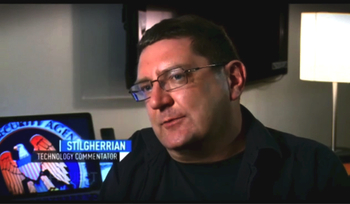 The revelation that the US National Security Agency (NSA) was engaged in such comprehensive spying of American citizens and their allies, some of it possibly unconstitutional, continues to make headlines.
The revelation that the US National Security Agency (NSA) was engaged in such comprehensive spying of American citizens and their allies, some of it possibly unconstitutional, continues to make headlines.
The focus has not narrowed to the manhunt for Edward Snowden as I’d feared. Instead, there’s a steady stream of mainstream news stories as new details emerge — including my third appearance on Channel TEN’s The Project on Monday night.
On the previous two occasions, when I was talking about cyberwar and crimefighting smartphones respectively, I was chatting with the presenters. Since they’re in Melbourne, that involved sitting in front of a green screen and looking down the barrel of a camera as if it’s your best friend.
But this time my comments were to be included in a stand-alone “package”, as they’re called, along with comments from Fairfax journalist Philip Dorling and others. So a videographer came to my hotel room on Friday afternoon to shoot me at my desk, while the Melbourne-based journalist asked me questions via speakerphone — and I looked toward a yellow piece of paper that indicated where the journalist might have been standing had he actually been there.
Ah, the magic of television!
The video of the three-and-a-half minute segment, including comments fore and aft by the presenters, is over the fold.
